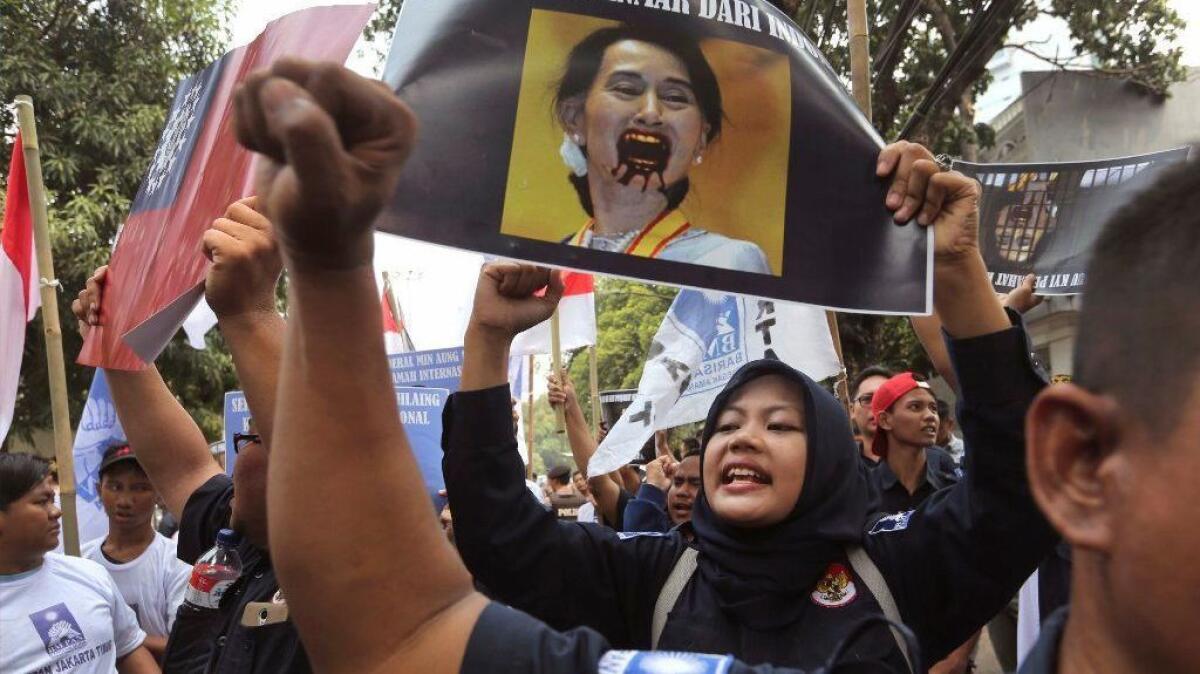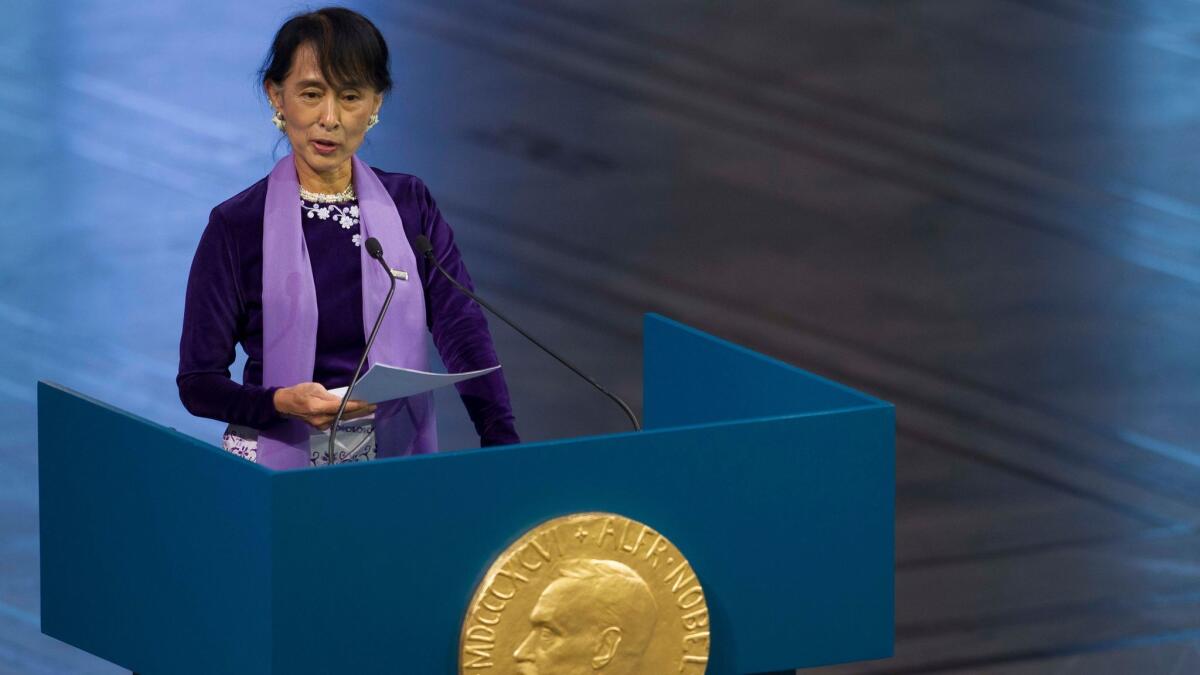How a humanitarian crisis tarnished Nobel winner Aung San Suu Kyi’s legacy, perhaps forever

- Share via
Reporting from Mumbai, India — She was once synonymous with the struggle against oppression. In accepting the Nobel Peace Prize, she called for “a world free from the displaced, the homeless and the hopeless.”
But Aung San Suu Kyi has missed perhaps her greatest opportunity to make good on those words as the leader of Myanmar’s first civilian government after a half-century of military rule.
Suu Kyi has watched as 270,000 minority Rohingya Muslims — one-quarter of their population — have fled Myanmar over the past two weeks, escaping a bloody military crackdown in which soldiers set fire to homes and shot civilians as they tried to escape, according to accounts published by human rights groups.
Many have crammed into muddy, overcrowded camps in next-door Bangladesh, whose authorities this week raised concerns that Myanmar’s military was planting land mines along the border while civilians fled. Dozens have drowned in river crossings. In displacement camps inside Myanmar, Rohingya activists say the government has blocked delivery of food and humanitarian supplies.
She really is in a very awkward position on this.
— An advisor to Suu Kyi’s government
As condemnations pour in from across the world, Suu Kyi has defended not the displaced Rohingya but the army, saying critics of the crackdown were being deceived by “a huge iceberg of misinformation.” The army calls its actions “clearance operations” aimed at Rohingya insurgents who attacked police on Aug. 25, killing 12 officers.
Reconciling an activist’s ideals with the hard realities of governing is never easy, but rarely has an international icon fallen so fast as Suu Kyi. Her tepid response to the Rohingya crisis has tarnished a reputation built during the 15 years she spent under house arrest opposing military dictators in the country formerly known as Burma.

The United Nations chief has warned that ethnic cleansing could be taking place. Two other Nobel Peace Prize winners, South Africa’s Desmond Tutu and 20-year-old Pakistani Malala Yousafzai, have implored Suu Kyi, 72, to speak up. Other commentators have urged the Nobel Committee to revoke her prize.
“She has a responsibility to give protection to civilians,” said a prominent Rohingya activist in Myanmar, who requested anonymity because authorities have warned people against criticizing the military campaign.
“And yet she is actively engaging with the army in terms of its operations to expel an entire population. She is a part of it.”
After leading her National League of Democracy party to an overwhelming win in 2015 parliamentary elections – and then devising the powerful post of state counselor to bypass a law that prevented her from becoming president – Suu Kyi faced tremendous expectations in turning around one of Asia’s poorest countries, one still wracked by several long-running insurgencies.
The Obama administration lifted economic sanctions in 2016, rewarding Myanmar’s democratic transition, although by that point there were serious questions about Suu Kyi’s commitment to the ideas expressed in her Nobel speech.
She has consistently declined to condemn abuses against the Rohingya, an ethnic and religious minority of more than 1 million people in a country that is 90% Buddhist, often saying that Buddhists have suffered too. Her government has echoed the military’s view that the Rohingya are illegal immigrants from Bangladesh, even though many trace their roots in Myanmar back several generations, and has continued a policy of denying them citizenship and other basic rights.
Read more: What Rohingya Muslims in Myanmar expected from Aung San Suu Kyi »
After a 2012 outbreak of communal violence in the western state of Rakhine in which scores of Buddhists and Rohingya died, 120,000 Rohingya lost their homes and were corralled into displacement camps. Many others live in what are essentially open-air prisons, their villages watched over by security forces.
The rise of a well-armed Rohingya insurgency has generated public support for military operations in Rakhine. A rising Buddhist nationalism has fanned the flames, led by hard-line monks who claim that Muslims want to overtake the country.
All but cut off from the world during the years of her house arrest, Suu Kyi was a steely, enigmatic symbol whose political inclinations — beyond ending the army’s kleptocratic rule — were not well known. Since the democratic transition began, Western journalists increasingly challenged her on the Rohingya issue, and Suu Kyi began to flash annoyance in interviews.
Her allies say she is trapped between international expectations and domestic political realities. She is known for a regal bearing that borders on haughty, but her powers are sharply limited. The army controls the key security-related ministries and one-quarter of seats in Parliament, and enjoys no civilian oversight.
“She really is in a very awkward position on this,” said an advisor to the Myanmar government who requested anonymity to speak freely.
“If she were to speak out more vociferously in defense of the Rohingya, she would lose a lot of her domestic support. In a country that’s been in relative isolation for a long period of time, with low levels of education, people can have fairly bigoted views, and the Buddhist majority are fairly unsympathetic to the plight of the Rohingya.”
Some say she may also worry for her safety.
This year, U Ko Ni, an advisor to Suu Kyi who was drafting a new constitution that would roll back the military’s powers, was assassinated at the international airport in Yangon. The brazen killing appeared to stun Suu Kyi, who waited several weeks before issuing a public statement about it.
Myanmar nationalists have called for tougher action against “Bengali terrorists” since the Aug. 25 attacks, which followed the report of a commission led by former U.N. Secretary-General Kofi Annan. The commission called on the government to end the “enforced segregation” of Buddhists and Muslims in Rakhine state, ensure access for humanitarian groups, revise citizenship laws that exclude the Rohingya and end restrictions on freedom of movement.
Thet Thet Khine, a lawmaker from Suu Kyi’s party, said the government was committed to implementing the recommendations. But she said the international community was wrong to view Rakhine state as purely a human rights issue.
“It is also an issue of security and economic development,” Thet Thet Khine said. “In the short term we have to work with the military. This is a terrorism issue superimposed on a communal crisis. The local people don’t trust the Bengali Muslim people.”
Suu Kyi “has to reconcile between the international community and the local community, and they are not in line,” she said. “She is trying her best.”
Others gave up on her long ago.
“I think she cares about power,” the Rohingya activist said. “She’s saying, ‘I’m not a human rights activist. I’m a politician.’ Any leader who cares about human rights would distance herself from mass atrocities. She is failing to do so.”
Follow @SBengali on Twitter for more news from South Asia
ALSO
‘Alarming number’ of 270,000 Rohingya flee violence in Myanmar, U.N. says
From Malala to the Taliban, anger across Asia at Myanmar’s violence against Rohingya Muslims
More to Read
Sign up for Essential California
The most important California stories and recommendations in your inbox every morning.
You may occasionally receive promotional content from the Los Angeles Times.











